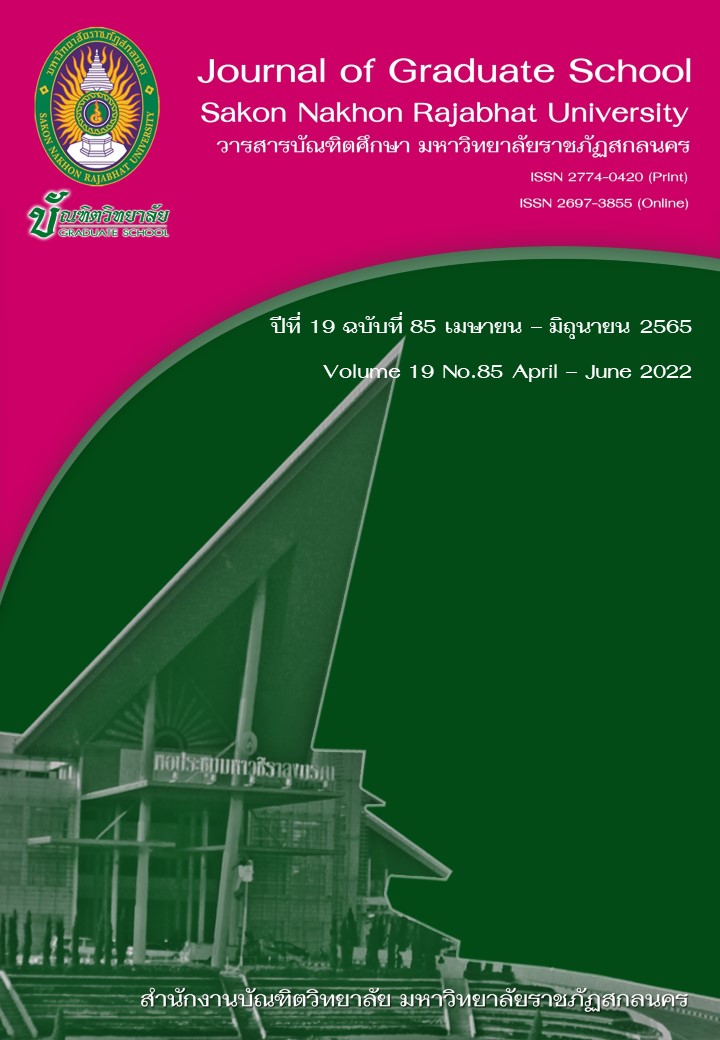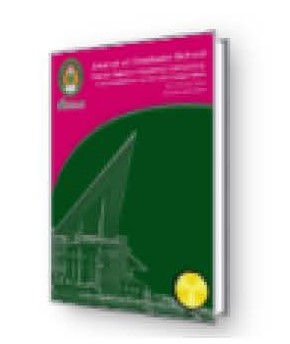แนวทางการพัฒนาภาวะผู้นำเชิงเทคโนโลยีของผู้บริหารสถานศึกษา สังกัดสำนักงานอาชีวศึกษาจังหวัดร้อยเอ็ด
คำสำคัญ:
ภาวะผู้นำ, เทคโนโลยี, ภาวะผู้นำเทคโนโลยี, แนวทางการพัฒนาบทคัดย่อ
การวิจัยมีวัตถุประสงค์ 1) เพื่อศึกษาสภาพปัจจุบัน สภาพพึงประสงค์ และความต้องการจำเป็นภาวะผู้นำเชิงเทคโนโลยีของผู้บริหารสถานศึกษา 2) เพื่อศึกษาแนวทางการพัฒนาภาวะผู้นำเชิงเทคโนโลยีของผู้บริหารสถานศึกษา โดยการวิจัยแบ่งออกเป็น 2 ระยะ คือ ระยะที่ 1 ศึกษาระดับสภาพปัจจุบัน สภาพที่พึงประสงค์ภาวะผู้นำเชิงเทคโนโลยีของผู้บริหารสถานศึกษา จากกลุ่มตัวอย่าง คือ ผู้บริหารสถานศึกษา 14 คน และครู 220 คน รวม 234 คน เครื่องมือที่ใช้ คือแบบสอบถาม คุณภาพเครื่องมือ ได้แก่ค่าดัชนีความสอดคล้อง 0.80–1.00 ค่าอำนาจจำแนกรายข้อระหว่าง 0.37–0.98 และค่าความเชื่อมั่น 0.90 ระยะที่ 2 ศึกษาแนวทางการพัฒนาภาวะผู้นำเชิงเทคโนโลยีของผู้บริหารสถานศึกษา จากผู้ทรงคุณวุฒิ จำนวน 8 คน และวิเคราะห์เนื้อหาข้อมูลที่ได้จากการสัมภาษณ์โดยวิธีการตีความแล้วนำเสนอแบบพรรณนา ผลการวิจัย พบว่า 1. ระดับสภาพปัจจุบันภาวะผู้นำเชิงเทคโนโลยีของผู้บริหารสถานศึกษา โดยรวมและรายด้านอยู่ในระดับมาก และมีสภาพที่พึงประสงค์ภาวะผู้นำเชิงเทคโนโลยีของผู้บริหารสถานศึกษา โดยรวมและรายด้านอยู่ในระดับมากที่สุด ผลการวิเคราะห์ค่าดัชนีความต้องการจำเป็นภาวะผู้นำเชิงเทคโนโลยีของผู้บริหารสถานศึกษา พบว่า ระดับความต้องการจำเป็นโดยรวม PNI Modified = 0.26 ทั้งนี้ ค่าดัชนีความต้องการจำเป็น (PNI Modified) จากต่ำสุดไปหามากสุด อยู่ระหว่าง 0.21 ถึง 0.30 2. แนวทางการพัฒนาภาวะผู้นำเชิงเทคโนโลยีของผู้บริหารสถานศึกษา คือ ผู้บริหารสถานศึกษาควรศึกษานโยบายของหน่วยงานต้นสังกัดและหลักการบริหารใหม่ ๆ เพื่อพัฒนาตนเองให้มีความรู้ ความสามารถ และมีทักษะสำหรับการใช้เทคโนโลยีสมัยใหม่เพื่อการบริหารสถานศึกษา กำหนดแผนการดำเนินงานด้านเทคโนโลยีสารสนเทศของสถานศึกษาอย่างเป็นระบบ พร้อมทั้งสร้างเครือข่ายในการแลกเปลี่ยนเรียนรู้ให้สอดคล้องกับการปรับเปลี่ยนทิศทางการศึกษา และกำหนดแนวทางการพัฒนาระบบเทคโนโลยีของสถานศึกษา พร้อมทั้งส่งเสริมให้บุคลากรในสถานศึกษาพัฒนาตนเองในด้านเทคโนโลยี และนำเทคโนโลยีมาใช้ในการบริหารงานทั้ง 4 ฝ่ายงานของสถานศึกษา รวมทั้งการจัดตั้งแหล่งเรียนรู้ทางเทคโนโลยีและจัดเตรียมวัสดุ อุปกรณ์ เครื่องมือดิจิทัล ที่เพียงพอต่อการใช้งานของบุคลากร นักเรียน นักศึกษา ให้สามารถสามารถเข้าถึงได้ง่ายในทุกที่ทุกเวลา
เอกสารอ้างอิง
จุฬาลักษณ์ อักษรณรงค์ และกุหลาบ ปุริสาร. (2561). ปัจจัยที่ส่งผลต่อภาวะผู้นำเชิงเทคโนโลยีสารสนเทศของผู้บริหารสถานศึกษา สหวิทยาเขตหนองหานสังกัดสำนักงานเขตพื้นที่การศึกษามัธยมศึกษา เขต 20 จังหวัดอุดรธานี. วารสารบัณฑิตเอเชีย, 8(2), 178-188.
ชัญญาภัค ใยดี. (2560). การศึกษาแนวทางการพัฒนาภาวะผู้นำเชิงเทคโนโลยีของผู้บริหารสถานศึกษา สังกัดองค์การบริหารส่วนจังหวัดนครราชสีมา. วารสารดุษฎีบัณฑิตทางสังคมศาสตร์, 8(1), 150-163.
ทินกร บัวชู และทิพภาพร บัวชู. (2562). ภาวะผู้นำดิจิทัลของผู้บริหารสถานศึกษา. วารสารสารครุศาสตร์สาร: Journal of Educational Studies, 13(2), 293.
ธีระ รุญจริญ. (2553). ความเป็นมืออาชีพในการจัดการและบริหารกรศึกษา ยุคปฏิรูปการศึกษา. (พิมพ์ครั้งที่ 3). ขอนแก่น: ข้าวฟ่างการพิมพ์.
มณีรัตน์ สุดเต้ และ หยกแก้ว กมลวรเดช. (2563). ภาวะผู้นำทางวิชาการในยุคดิจิทัลของผู้บริหารสถานศึกษาโรงเรียนขยายโอกาสทางการศึกษาสังกัดสำนักงานเขตพื้นที่การศึกษาประถมศึกษาอุตรดิตถ์ เขต 2. วารสารมหาจุฬานาครทรรศน์, 7(8), 334.
รุ่งรัตน์ พลชัย. (2563). ภาวะผู้นำกับการบริหารในยุคดิจิทัล Leadership and Administration in the Digital Age. วารสารมนุษยศาสตร์และสังคมศาสตร์ มมร. วิทยาเขตอีสาน, 1(3), 60.
สำนักงานอาชีวศึกษาจังหวัดร้อยเอ็ด. (2562).แผนปฏิบัติการสำนักงานอาชีวศึกษาจังหวัดร้อยเอ็ด ประจำการศึกษา 2562. ร้อยเอ็ด: สำนักงานอาชีวศึกษาจังหวัดร้อยเอ็ด.
สุกัญญา แช่มช้อย. (2558). ภาวะผู้นำทางเทคโนโลยี: การนำเทคโนโลยีสู่ห้องเรียนและโรงเรียนในศตวรรษที่ 21. วารสารศึกษาศาสตร์ มหาวิทยาลัยนเรศวร, 16(4), 227-224.
สุกัญญา แช่มช้อย. (2561). การบริหารสถานศึกษาในยุคดิจิทัล. กรุงเทพฯ: โรงพิมพ์แห่งจุฬาลงกรณ์มหาวิทยาลัย.
สุนันทา สมใจ และ วิชุดา กิจธรธรรม. (2561). การบริหารสถานศึกษาด้วยภาวะผู้นำทางเทคโนโลยี School Administration by Technology Leadership. วารสารวิทยาลัยดุสิตธานี, 12(1), 3.
สำนักงานส่งเสริมเศรษฐกิจดิจิทัล กระทรวงดิจิทัลเพื่อเศรษฐกิจและสังคม. (2560). แผนปฏิบัติราชการ 4 ปี พ.ศ. 2561-2564. (2562). เข้าถึงได้จาก https://www.mdes.go.th. 9 ตุลาคม 2562.
สำนักงานคณะกรรมการการอาชีวศึกษา. (2562). รายงานผลการปฏิบัติการประจำปีการศึกษา พ.ศ. 2562. เข้าถึงได้จาก http://bme.vec.go.th/Portals/30/DOWNLOAD/Annual%20Report/2561.pdf. 10 ตุลาคม 2562.
อรัญ ซุยกระเดื่อง. (2557). การวิจัยทางการศึกษา (Educational Research). มหาสารคาม: มหาวิทยาลัยราชภัฏมหาสารคาม.
The ISTE. (2009). International Society for Technology in Education. Retrieved from: https://www.kelloggllc.com/tpc/netsy15.pdf. October 10th, 2019.
Singhan, P. (2015). School Administrators' Competency in using the Information Communication and Technology for Supporting the Administration and Management of Education in School Under the Office of Educational Service Area 1. Journal of education Khon Kaen University. 58-166.
ดาวน์โหลด
เผยแพร่แล้ว
รูปแบบการอ้างอิง
ฉบับ
ประเภทบทความ
สัญญาอนุญาต
ลิขสิทธิ์ (c) 2022 วารสารบัณฑิตศึกษา มหาวิทยาลัยราชภัฏสกลนคร

อนุญาตภายใต้เงื่อนไข Creative Commons Attribution-NonCommercial-NoDerivatives 4.0 International License.
บทความทุกบทความที่ตีพิมพ์ในวารสารบัณฑิตศึกษา มหาวิทยาลัยราชภัฏสกลนคร ถือว่าเป็นลิขสิทธิ์ของบัณฑิตวิทยาลัย มหาวิทยาลัยราชภัฏสกลนคร






